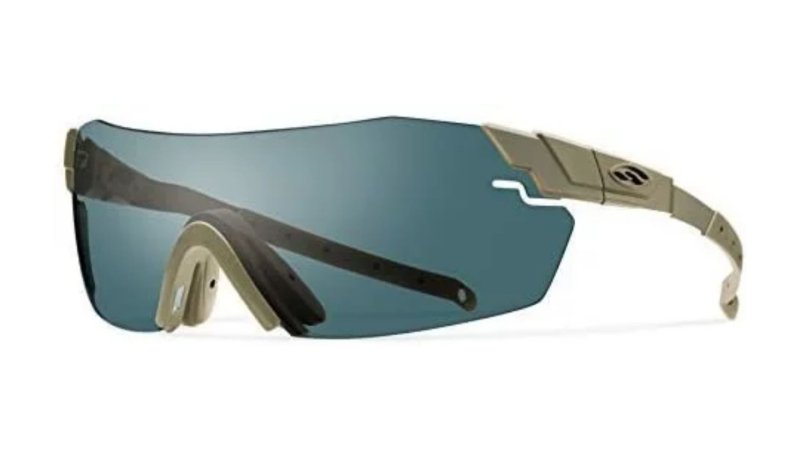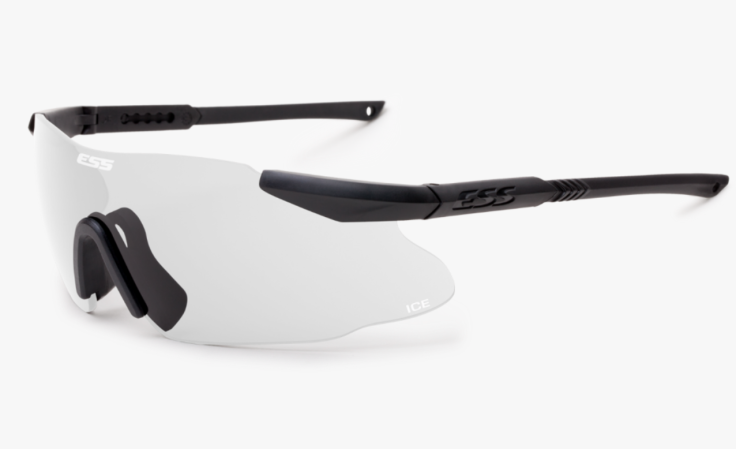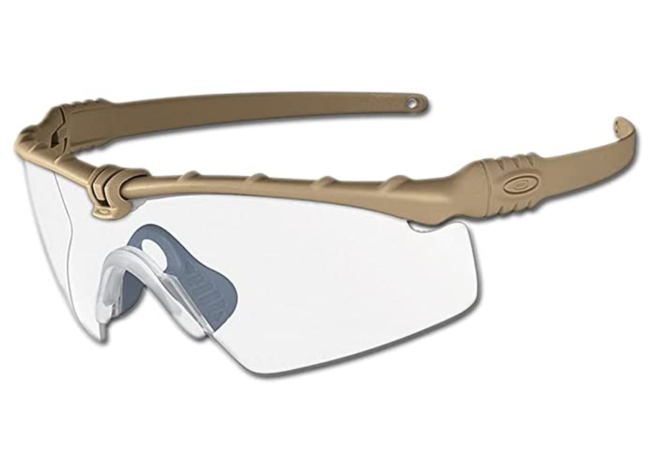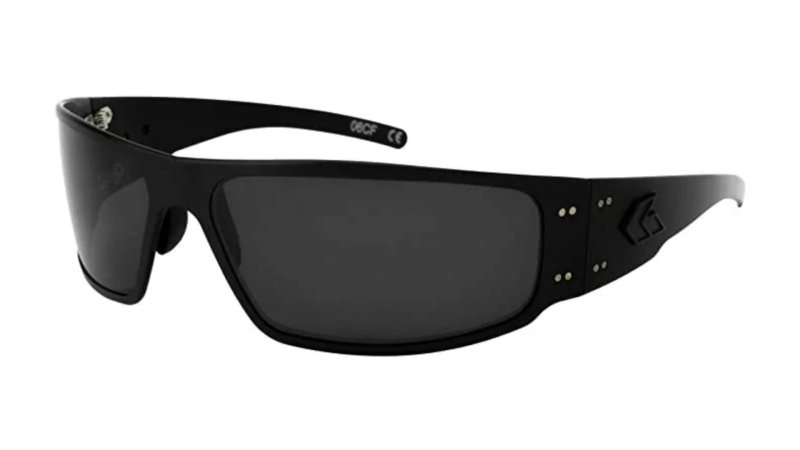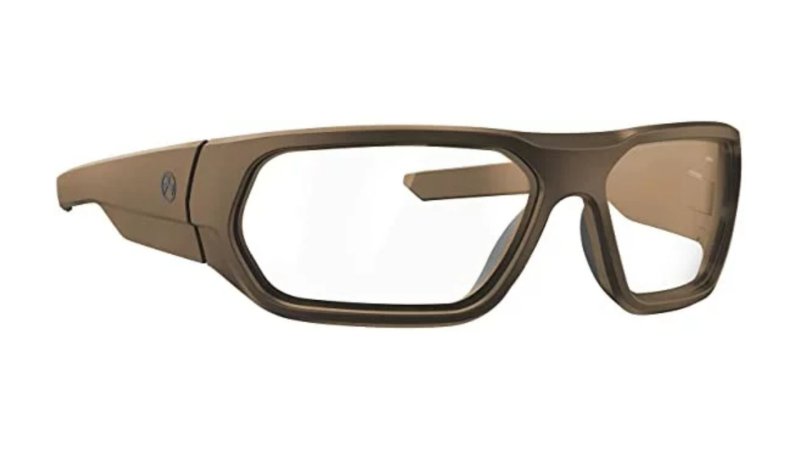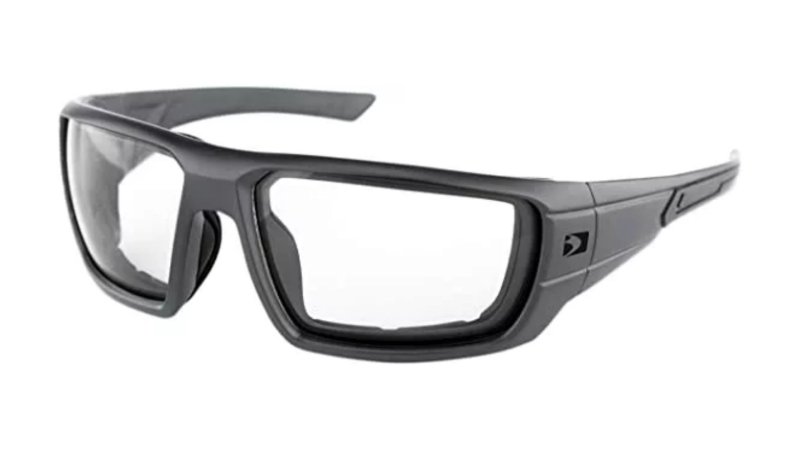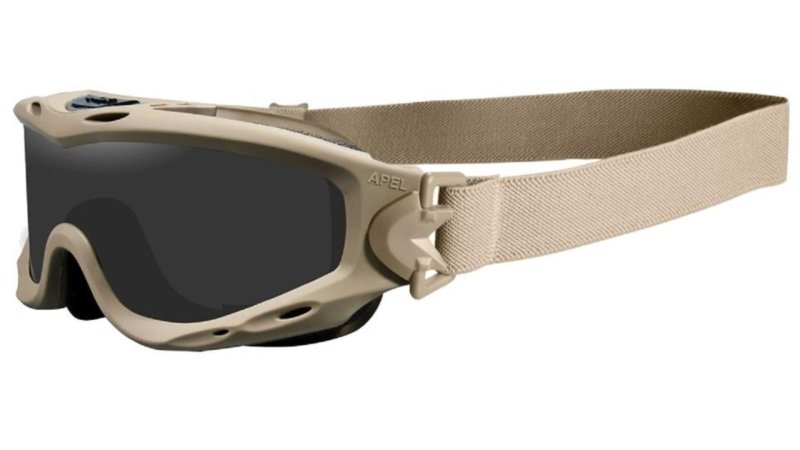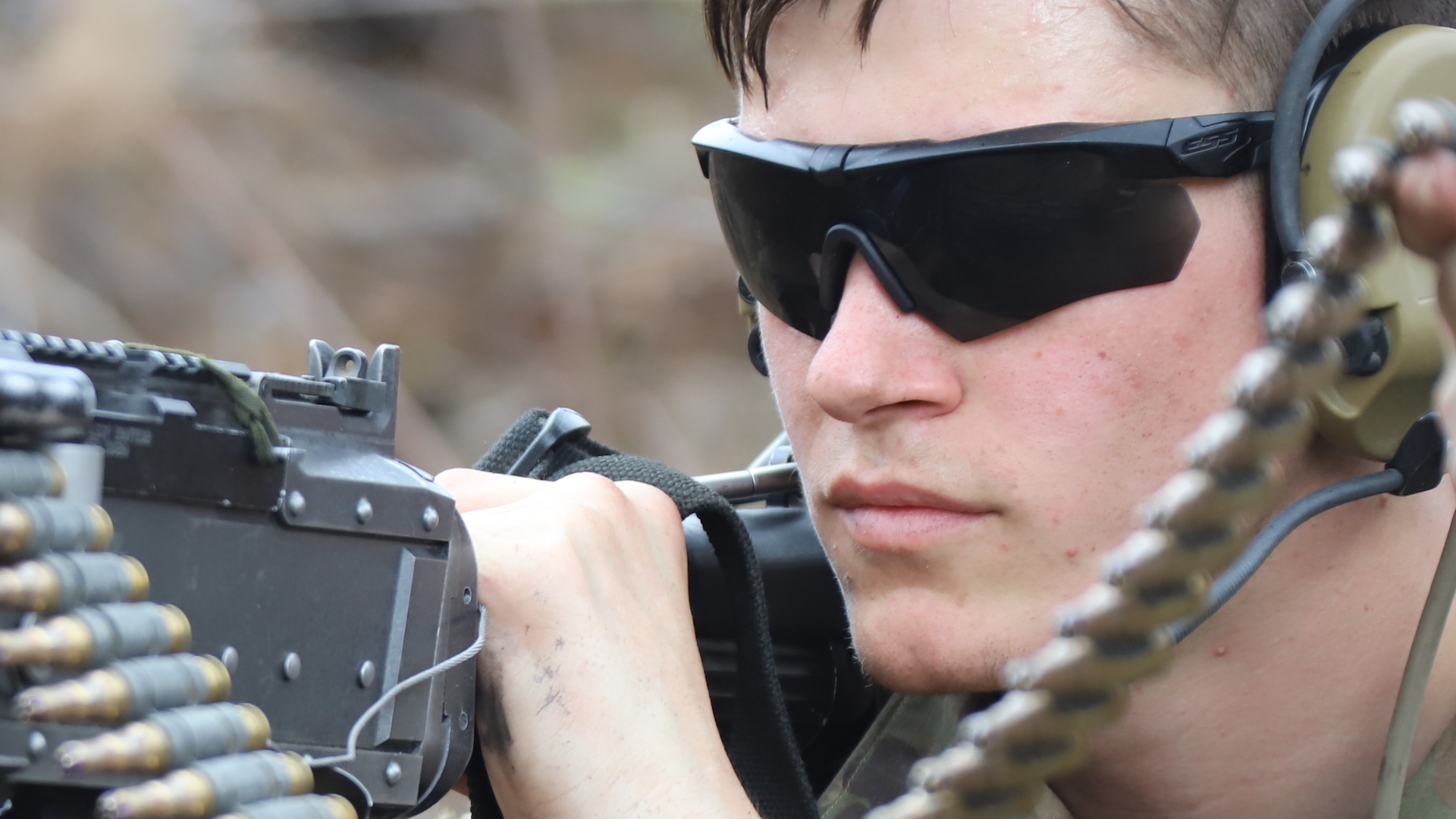

We may earn revenue from the products available on this page and participate in affiliate programs.
Ballistic glasses are half of the “eyes and ears” equation when it comes to shooting safety. It’s important to take them seriously, but sometimes that’s easier said than done. In the Marine Corps, my issued eye pro seemed like it was intentionally designed to fog up, scratch, jab me in the temples, and generally make life miserable. I don’t have proof that those glasses were designed by the Taliban, but I have my suspicions.
Because those glasses were terrible, they occasionally developed a bewildering habit of falling right off my face as soon as I reached the firing line. I was always so focused on my shooting that I never noticed those foggy pieces of crap resting on the ground until after I’d successfully completed my string of fire. It wasn’t until I deployed that I invested in a pair of my own and realized that ballistic glasses can actually be a real asset if they’re actually built well.
To save you from eye ocular trauma, furious range safety officers, and financial mistakes, we took it upon ourselves to chase down some of the best ballistic glasses out there. Our search was focused on products that meet the U.S. military’s MIL-PRF-31013 standard for protective eyewear. Many can be found on the Army’s Authorized Protective Eyewear List. All of our picks have our vote of confidence when it comes to keeping your eyes safe, your face comfortable, and your chain of command quiet––unless someone’s asking where they can get a pair like yours.
Best Overall
Smith PivLock Echo
Pros
- Compatible with over-ear hearing protection
- Frameless design allows ample airflow
- Lens reduces the risk of fog, discoloration, and distortion
- Changing lenses is quick and easy
Cons
- Lots of independent components to keep track of
- Fit is tighter than you might be used to
- Lack of a frame could lead to easier scratching
Product Specs
- Safety rating: MIL-PRF-31013
- Polarized: No
- Removable lenses: Yes
Best Value
ESS Ice
Pros
- One set of clear, one set of tinted
- Adjustable temple tips for a better fit
- Consistent with what’s issued
- Comes with a hard case, cleaning solution, and microfiber cloth
Cons
- Prioritize cost over comfort
- Not as desirable as higher-end glasses
- Adequate, but not exceptional
Product Specs
- Safety rating: MIL-PRF-31013, ANSI Z87.1
- Polarized: No
- Removable lenses: Yes
Editor’s Choice
Oakley M Frame
Pros
- Known for toughness and quality
- Choose the right combination of frame and lens colors
- Oakley SI discount is no joke
- Easy to switch lenses
Cons
- Styling has a video game vibe
- Top of the frame may get in the way
- Oakley SI discount requires you to set up an account
Product Specs
- Safety rating: MIL-PRF-31013, ANSI Z87.1
- Polarized: No
- Removable lenses: Yes
Best Premium Ballistic Glasses
Gatorz Magnum
Pros
- Extremely durable aluminum frame
- Selection of clear, tinted, and photochromic lenses
- Coated to protect against fog and oils
- Adjustable to get the perfect fit
Cons
- Far more expensive than the alternatives
- Tested to slightly different standards
- Lenses are not interchangeable
Product Specs
- Safety rating: MIL-PRF-32432A, ANSI Z87.1-2015
- Polarized: No
- Removable lenses: No
Best Everyday Ballistic Glasses
Magpul Radius
Pros
- Wear them to the range, then out to dinner
- Excellent wraparound protection
- Choice of polarized or non-polarized lenses
- Frames are rugged enough for use in the field
Cons
- Still fairly tactical in appearance
- Smaller production runs can limit the availability of colors
- Not as comfortable as glasses with soft temples
Product Specs
- Safety rating: MIL-PRF-31013
- Polarized: Yes
- Removable lenses: No
Best Glasses for Motorcyclists
Bobster Mission
Pros
- Riding glasses that meet military ballistic standards
- Styling looks right at home on the bike or around town
- Foam padding can easily be installed or removed
- Priced competitively, especially considering the versatility
Cons
- Limited frame and lens color selection
- Lenses are not removable
- Foam padding takes getting used to
Product Specs
- Safety rating: MIL-PRF-31013, ANSI Z87.1
- Polarized: No
- Removable lenses: No
Best Ballistic Goggles
Wiley X Spear
Pros
- Great goggle-to-skin seal to keep out dust and debris
- Compatible with NVGs
- Can be ordered with extra lens options
- Coated to protect against scratching and fogging
Cons
- Not as comfortable as ballistic glasses
- Likely to get less use than ballistic glasses
- A little bit pricey if you don’t use goggles often
Product Specs
- Safety rating: MIL-PRF-32432
- Polarized: No
- Removable lenses: Yes
Why you should trust us
I set out to find quality ballistic glasses you’ll actually want to wear because I, too, have made do with gear that barely checks the boxes. There are times when the bare minimum is good enough, but the instant a piece of shrapnel gets intercepted millimeters from your cornea is not one of them. I’ve used various makes and models of ballistic glasses when shooting handguns and long guns; behind iron sights, red dots, and magnified optics. I know how important it is to have clear vision when you’re shooting for a living and I wouldn’t have you use anything but the best you can get.
Types of ballistic glasses
“Ballistic glasses,” “eye protection,” and “safety glasses” get tossed around interchangeably and there are some important reasons not to mix them up. A woodshop and an open-faced motorcycle helmet do not present the same hazards. What you deal with on a shooting range and what you face in combat are two very different things. There’s great eye pro for all those scenarios, but it isn’t one-size-fits-all kind of gear.
Ballistic glasses for shooting
If you found your way to Task & Purpose, you probably need ballistic glasses that are tough enough for the international two-way shooting gallery. Eye protection for shooters can be divided into two categories: those built to civilian standards and those built to military standards.
The civilian ANSO Z87.1-2020 standard requires ballistic glasses to protect your eyes from projectiles in a wide variety of settings. This includes hunting and recreational shooting, but the threats you’ll encounter in those activities are nothing compared to the dangers of a hot battlefield. The military’s MIL-PRF-31013 standard subjects ballistic glasses to much harsher testing, and that’s the standard we used for this gear guide.
Ballistic glasses for work
If you need eye protection for work on a construction site, machine shop, lumber yard, or other dynamic environments, the ANSI standard is more than sufficient. You can open up your options and save a bundle by shopping in this category of eye protection, too.
These glasses can also serve you perfectly well in recreational shooting sports. You don’t need the very toughest eye protection to poke holes in paper or knock down game animals, so you should be in good hands with a pair of ANSI-approved shooting glasses. Just don’t bring them to one of Uncle Sam’s shooting ranges.
Ballistic glasses for motorcycling
We’d love to believe that every service member is a stone-cold gunslinger, but the reality is that most people shoot once a year to qualify––if they even do that. It’s entirely possible that there are more motorcyclists than serious shooters in the U.S. Military.
The military requires service members to wear a DOT-approved helmet, but you don’t have to wear a full-face helmet. Open-face alternatives are popular, but they aren’t the safest type of motorcycle helmet. Aside from leaving your money-maker exposed to asphalt and truck bumpers, they do nothing to protect your eyes. You can upgrade your riding safety with a solid pair of ballistic glasses. Your options range from impact-resistant sunglasses to padded goggles. All of them are better than your reflexes.
Key features of ballistic glasses
Ballistic glasses need to protect your eyes from debris, shrapnel, and projectiles––that’s a given. But they also need to be clear enough to provide a quality sight picture and tough enough to remain that way in the field. If you’re going to spend your own cash on a pair, it better be comfortable, too.
Ballistic standards
We’re not suggesting that you should take your favorite pair of shades to the range and pepper them with 12-gauge target load because we all know that would end poorly. That’s exactly why they don’t belong at the range. Ballistic glasses, on the other hand, are built specifically for that kind of abuse and are subject to strict performance standards.
There are a whole bunch of standards for protective eyewear, but the most common is ANSI Z87.1-2020. This standard acts as the stamp of approval for protective eyewear built for the civilian market. If you own protective glasses for work, hobbies, or recreational shooting, “Z87+” is probably stamped somewhere on the frame.
The military’s MIL-PRF-31013 standard is much higher, though. That’s because instead of protecting your eyes against mulch getting flung out of a lawnmower, ballistic glasses need to stop projectiles like shrapnel from explosives. If you want an excellent visual of the differences between these standards, check out this video from ESS. Every pair of ballistic glasses on this list meets or exceeds MIL-PRF-31013.
Color and clarity
You can’t shoot what you can’t see, so your eye protection needs to offer an excellent view at all times. Most ballistic glasses come with clear lenses that let you see the world exactly as it is. Some use tinted lenses that act like sunglasses. Others use various colors that are designed to improve your vision in specific circumstances.
One common problem with eye protection is fogging. Moisture from the air or your breath can condensate on the lenses and effectively blind you, so the best ballistic glasses use anti-fogging coatings to stay clear. They should also be resistant to scratching since you aren’t going to be babying your eye pro.
Fit
Being safe and having a good view are great, but you aren’t likely to wear your ballistic glasses if they aren’t comfortable. In addition to finding something that fits the size and shape of your face, you’ll need to find eye protection that works with the rest of your gear.
Oversized frames can interfere with the proper fit of your helmet. Large temples might offer protection from the sides, but they can break the seal of over-ear hearing protection and compromise your hearing. It might be tempting to buy the ballistic glasses that look the coolest to you, but step back and make sure they’ll be able to do their job. There’s a reason most of our picks are pretty minimalist in design.
Benefits of ballistic glasses
Let’s not make this more complicated than it needs to be.
Not getting your eyes blown out
You got two eyes? You like them? Watch this if you’re still on the fence.
Not incurring the range safety officer’s wrath
Now that you’ve made up your mind about buying some decent ballistic glasses, let’s not forget that the military is full of fashion police just waiting to check your vibe over a mirrored lens or something. Shopping with the Army APEL in mind is a good way to stay on the first sergeant’s safe side, but it isn’t an exhaustive list.
Your command’s leniency may vary, but it’s hard to go wrong with flat black frames and clear lenses. If you’re going to deviate from the relative safety of that combination, look for moderately tinted lenses and frames that are matte green or tan––although we have to point out that Oakley sells the M Frame in multicam and it looks the business.
Not getting a bill from supply
Regular readers know that I had to reimburse supply for eye pro that got destroyed in Afghanistan and that I’ still very annoyed. If you weren’t savvy enough to take your issued gear directly home and put it away until you check out, you might be in the same boat. If that’s the case, it’s almost definitely cheaper to find a replacement pair on the open market than to pay the government to replace them for you.
If yours aren’t already scratched or broken, put those bad boys away and get something decent to actually wear. Quality ballistic glasses are bound to be more comfortable and look better in addition to being something you can actually use and enjoy.
Ballistic glasses pricing
Budget
There are bargains to be found in the sub-$50 ballistic glasses market if you know where to look. Some, like the ESS Ice, offer more than enough protection. They keep costs down by using simpler designs and less expensive materials. The result is a product that doesn’t feel as high-end as the alternatives but still meets the same safety criteria.
Be wary of glasses that are compliant with ANSI Z87.1-2020 but not MIL-PRF-31013. They can be great for yardwork and casual days at a shooting range, but they aren’t cut out for the demands of military life. These glasses are easy to spot because they’re incredibly cheap––we found some for less than $5.
Mid-range
Many of the popular ballistic glasses on the market fall into the $50 to $100 price range. These can be a great compromise for buyers who want a little extra comfort or style from their MIL-PRF-31013 eye protection but aren’t ready to make the leap to premium ballistic glasses.
Some of our favorites are the Magpul Radius and Bobster Mission. Both provide enough protection to satisfy the military standard and come in subdued color schemes that are sure to keep uniform guideline enthusiasts happy. You can also find higher-end glasses on sale every now and then. Oakley also offers products to service members at a hefty discount through Oakley SI.
Premium
Considering the kind of abuse ballistic glasses have to endure, it shouldn’t be a surprise to see triple-digit price tags for premium options. For that kind of money, you can expect top-tier materials that will last many years in the field. You’ll also get to enjoy more comfort since premium ballistic glasses are designed to be worn with a helmet and ear protection for hours on end.
Some of our favorites come from Smith Optics and Oakley. Premium glasses are worth the investment in our opinion because they’re often more comfortable and longer-lasting than less expensive options. If you really want to treat yourself, jump up to the Gatorz Magnum.
How we chose our top picks
We started our search for the best ballistic glasses by making a list of the brands we know and trust. Are there up-and-coming manufacturers that make good eye pro? There probably are, but we’ll let them cut their teeth on someone else’s readers. Next, we factored in applicable safety standards. Safety glasses designed for civilian use are held to the ANSI Z87.1-2020 but might not be up to the realities of combat, so we only included glasses that meet the U.S. military’s MIL-PRF-31013 standard for ballistic eye protection. Sticking to options that appear on the Army APEL is a safe bet (and some of our picks can be found on that list), but there are lots of options that are as good or better and are appropriate for wear in uniform, so we didn’t confine ourselves to that list.
FAQs on ballistic glasses
You’ve got questions, Task & Purpose has answers.
Q: What ballistic glasses does the U.S. military use?
A: Whichever ones are the cheapest and/or have the best lobbyist, we’d assume. Any ballistic glasses that meet the military’s safety standards and satisfy your uniform regulations are likely a significant upgrade.
Q: Do ballistic glasses really work?
A: Yes, they do. Ballistic glasses that meet MIL-PRF-31013 standards, in particular, are held to an extremely high standard and offer a great deal of protection against shrapnel.
Q: Do ballistic goggles offer more protection than ballistic glasses?
A: Goggles aren’t necessarily a better line of defense against projectiles, but they will keep dust and sweat away from your eyes better than glasses because they fit tightly to your skin. Fogging and heat may be more problematic, though, so there’s no perfect answer.
Our gear section
Scott Murdock is a Task & Purpose commerce writer and Marine Corps veteran. He’s selflessly committed himself to experiencing the best gear, gadgets, stories, and alcoholic beverages in the service of you, the reader.
